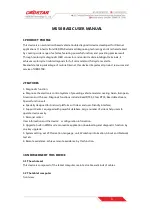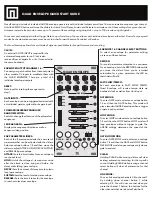
Gas exchange
production and O
2
consumption, as well as the energy expenditure, EE, which indicates
the number of calories of energy the patient is using. The measurement of pulmonary
gas exchange corresponds to the release of energy from the body in a steady state.
A steady state condition can be defined as a period of time after the patient has
stabilized from any changes and will not incur further changes in treatment that may
affect their gas exchange or increase metabolism. Whenever the homeostasis of a
patient is changed, the steady state condition is disrupted, and a certain period of
time has to pass before a new steady state is re-established. This should be noted
in short-time measurement. In continuous measurement, obtaining average results
over longer periods helps eliminating the effects of varying steady state.
Oxygen consumption (VO
2
)
Indirect calorimetry measures oxygen consumption as the uptake of oxygen from the
respiratory gases. Acute changes in ventilation, hemodynamics, and physical activity
may induce wide variations in the VO
2
measured by any method. Since VO
2
can be
measured continuously, the transient changes in the measured VO
2
can be readily
observed in prolonged measurements.
Under aerobic conditions, VO
2
depends on the metabolic activity of the tissues. At a
given metabolic rate, the substrates of energy metabolism also have an impact on
the VO
2
, since the amount of oxygen required to produce the same amount of energy
from different substrates varies. The amount of oxygen needed to produce 1 kcal of
energy from carbohydrate is 207 ml, from fat 213 ml, and from protein 223 ml.
If the amount of oxygen delivered to the tissues is inadequate for metabolic needs,
tissue oxygen consumption becomes dependent on oxygen delivery and anaerobic
metabolism with lactic acid production will ensue. During anaerobic metabolism, the
VO
2
measured from the respiratory gases does not reflect the tissue oxygen needs,
since an oxygen debt develops in the tissues. When aerobic conditions are restored,
the oxygen debt will be reflected as increased oxygen consumption.
Carbon dioxide production (VCO
2
)
Measurement of carbon dioxide production (VCO
2
) by indirect calorimetry is
susceptible to major errors unless the close relationship between VCO
2
, alveolar
ventilation (VA), and arterial CO
2
(PaCO
2
) is taken into account. According to the
classical Bohr's equation, VCO
2
= VA x PaCO
2
/k, where k is a constant that depends on
the units and the conditions (pressure, temperature, humidity) of the measurement.
The constant is equal to 0.1150 when:
●
VCO
2
is given in ml/min, standard temperature (0°C) and dry gas (STPD),
●
VA is given in l/min, 37 °C, and fully saturated with water vapor (BTPS),
●
and PaCO
2
is given in kPa,
The Bohr's equation demonstrates that the measurement of VCO
2
is sensitive to
changes in ventilation: any change in alveolar ventilation will be directly reflected in
VCO
2
until a new steady state of PaCO
2
has been achieved.
In steady state, VCO
2
depends on the metabolic activity of the tissues and, similarly
to VO
2
, on the substrates of the energy metabolism. Production of 1 kcal of energy
from carbohydrate produces 207 ml of CO
2
, from fat it produces 151 ml, and from
protein it produces 181 ml. If any of the variables in the Bohr's equation changes,
the body CO
2
pool will change. Under these circumstances, enough time should be
allowed for the body CO
2
pool to stabilize if the measured VCO
2
should reflect the
metabolic production of CO
2
. Continuous measurement of gas exchange facilitates
the verification of a steady state.
344
CARESCAPE Modular Monitors
2062971-001
Summary of Contents for CARESCAPE
Page 38: ...38 CARESCAPE Modular Monitors 2062971 001 ...
Page 114: ...Setting up the monitor before use 114 CARESCAPE Modular Monitors 2062971 001 ...
Page 146: ...Alarms 146 CARESCAPE Modular Monitors 2062971 001 ...
Page 218: ...Pulse oximetry 218 CARESCAPE Modular Monitors 2062971 001 ...
Page 234: ...Non invasive blood pressure 234 CARESCAPE Modular Monitors 2062971 001 ...
Page 260: ...Temperature 260 CARESCAPE Modular Monitors 2062971 001 ...
Page 274: ...Cardiac output 274 CARESCAPE Modular Monitors 2062971 001 ...
Page 280: ...Mixed venous oxygen saturation SvO 280 CARESCAPE Modular Monitors 2062971 001 ...
Page 338: ...Patient Spirometry 338 CARESCAPE Modular Monitors 2062971 001 ...
Page 372: ...Neuromuscular transmission 372 CARESCAPE Modular Monitors 2062971 001 ...
Page 404: ...Laboratory data 404 CARESCAPE Modular Monitors 2062971 001 ...
Page 410: ...Calculations 410 CARESCAPE Modular Monitors 2062971 001 ...
Page 416: ...Drug calculations 416 CARESCAPE Modular Monitors 2062971 001 ...
Page 424: ...Trends 424 CARESCAPE Modular Monitors 2062971 001 ...
Page 432: ...Snapshots and events 432 CARESCAPE Modular Monitors 2062971 001 ...
Page 462: ...Cleaning and care 462 CARESCAPE Modular Monitors 2062971 001 ...
Page 528: ...Abbreviations yr year yrs years 528 CARESCAPE Modular Monitors 2062971 001 ...
Page 546: ...Skills checklist 546 CARESCAPE Modular Monitors 2062971 001 ...
Page 547: ...content ...
















































